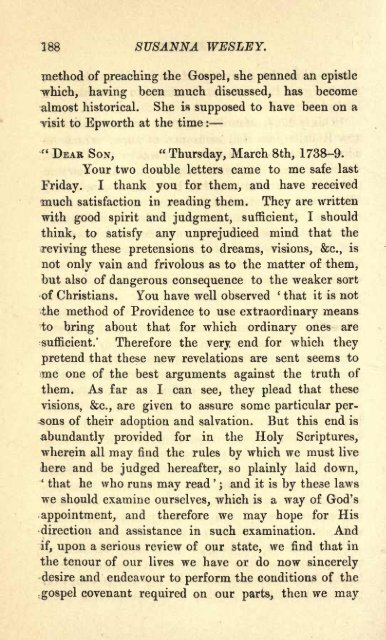Susanna Wesley
This is the story of Susanna Wesley, 1669-1742 Mother of Charles and John Wesley, who were founders of the Methodist Church. Susanna and her husband, Samuel, had nineteen children, ten of whom survived to adulthood. Her son Charles became a well-known hymn writer and her son John became the found of Methodism. Susanna was brought up in a Puritan home as the youngest of twenty-five children. As a teenager, she became a member of the Church of England. She became the wife of a chronically debt-ridden parish rector in an English village. She said, "I have had a large experience of what the world calls adverse fortune." Nonetheless, Susanna managed to pass down to her children Christian principles that stayed with them.
This is the story of Susanna Wesley, 1669-1742 Mother of Charles and John Wesley, who were founders of the Methodist Church. Susanna and her husband, Samuel, had nineteen children, ten of whom survived to adulthood. Her son Charles became a well-known hymn writer and her son John became the found of Methodism.
Susanna was brought up in a Puritan home as the youngest of twenty-five children. As a teenager, she became a member of the Church of England. She became the wife of a chronically debt-ridden parish rector in an English village. She said, "I have had a large experience of what the world calls adverse fortune." Nonetheless, Susanna managed to pass down to her children Christian principles that stayed with them.
You also want an ePaper? Increase the reach of your titles
YUMPU automatically turns print PDFs into web optimized ePapers that Google loves.
188 SUSANNA WESLEY.<br />
method of preaching the Gospel, she penned an epistle<br />
Tvhich, having been much discussed, has become<br />
almost historical. She is supposed to have been on a<br />
visit to Epworth at the time :<br />
" DEAR SON,<br />
" Thursday, March 8th, 1738-9.<br />
Your two double letters came to me safe last<br />
Friday. I thank you for them, and have received<br />
much satisfaction in reading them. They are written<br />
with good spirit and judgment, sufficient, I should<br />
think, to satisfy any unprejudiced mind that the<br />
reviving these pretensions to dreams, visions, &c., is<br />
not only vain and frivolous as to the matter of them,<br />
but also of dangerous consequence to the weaker sort<br />
of Christians. You have well observed ' that it is not<br />
the method of Providence to use extraordinary means<br />
to bring about that for which ordinary ones are<br />
sufficient.' Therefore the very end for which they<br />
pretend that these new revelations are sent seems to<br />
me one of the best arguments against the truth of<br />
them. As far as I can see, they plead that these<br />
visions, &c., are given to assure some particular per-<br />
-sons of their adoption and salvation. But this end is<br />
abundantly provided for in the Holy Scriptures,<br />
wherein all<br />
may find the rules by which we must live<br />
here and be judged hereafter, so plainly laid down,<br />
'<br />
that he who runs may read ' ;<br />
and it is<br />
by these laws<br />
we should examine ourselves, which is a way of God's<br />
appointment, and therefore we may hope for His<br />
direction and assistance in such examination. And<br />
if, upon a serious review of our state, we find that in<br />
the tenour of our lives we have or do now sincerely<br />
desire and endeavour to perform the conditions of the<br />
gospel covenant required on our parts, then we may


















